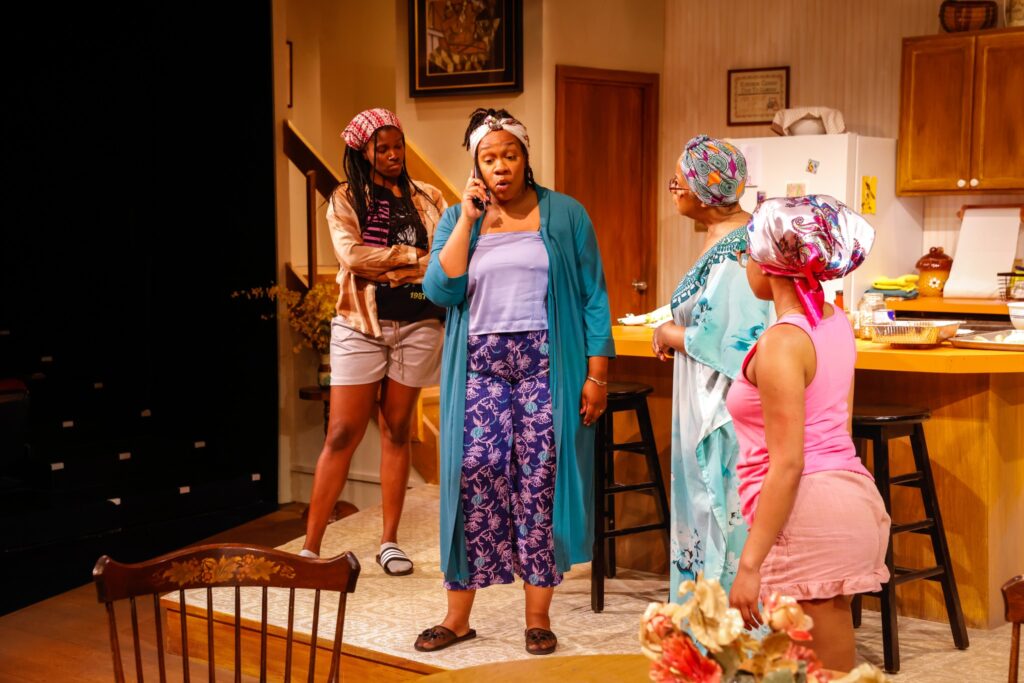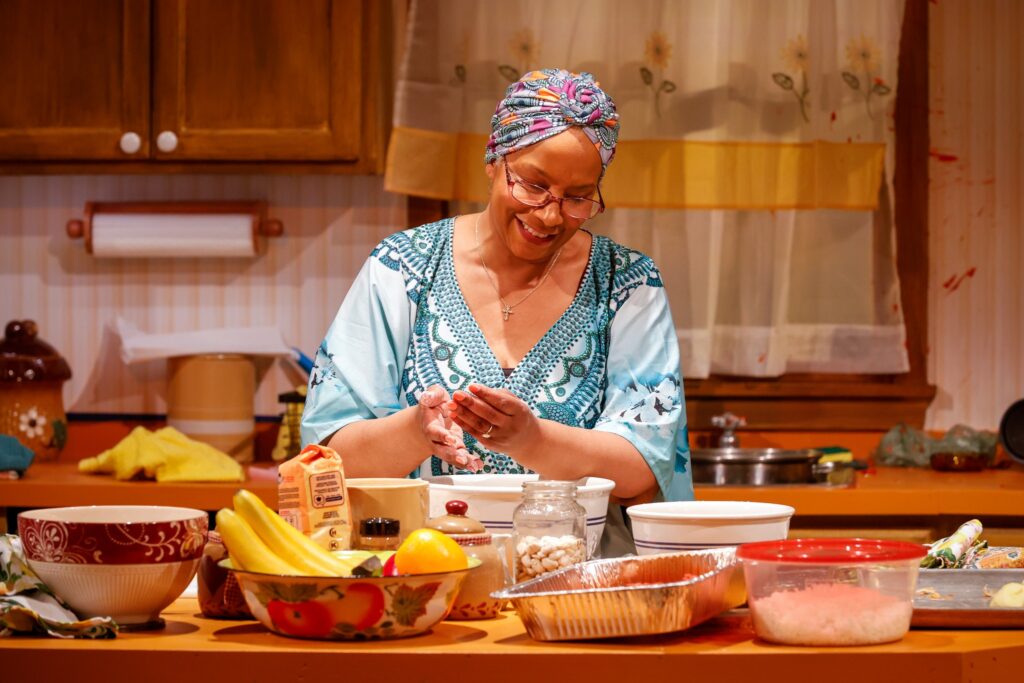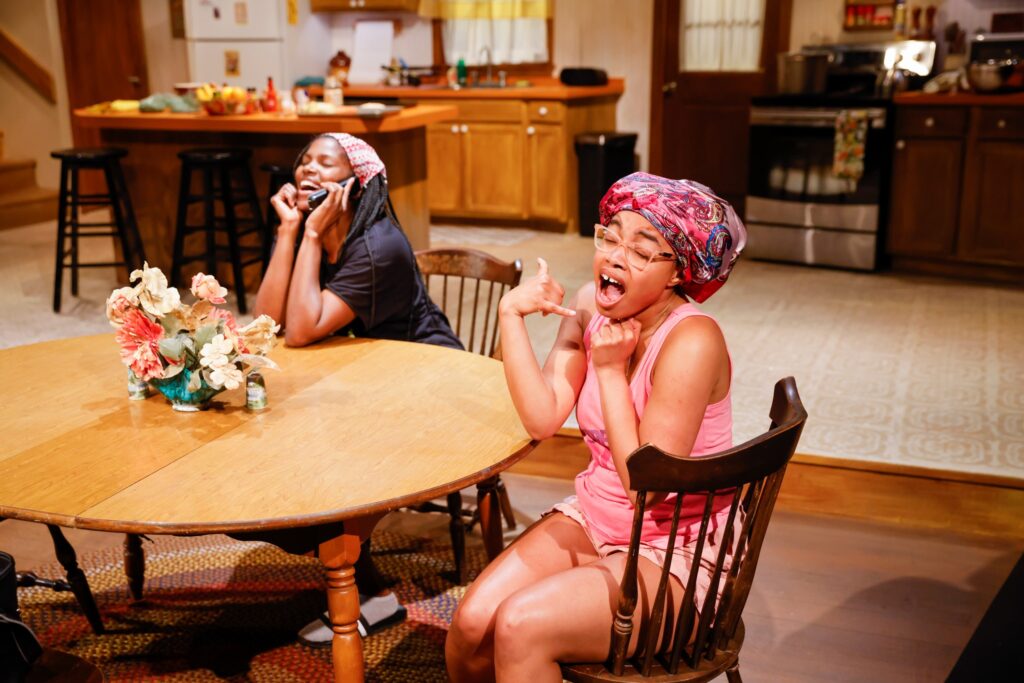
‘STEW’ – Written by Zora Howard. Directed by Rosalind Bevan. Scenic Design by JennaMcFarland Lord. Costume Design by KJ Gilmer. Lighting Design by Kat C. Zhou. SoundDesign by Aubrey Dube. Presented by Gloucester Stage, 267 E Main St, Gloucester, MAthrough July 23.
By Shelley A. Sackett
Stew is any dish that is prepared by “stewing” — that is, submerging the ingredients with just enough liquid to cook them through on a low flame in a covered pot for a longtime. It is also a synonym for brooding. One who is in an extreme state of worry and agitation is said to be “stewing.”
Playwright Zora Howard has captured the richness of the dish and the simmering state of its emotional namesake in her 90-minute intermission-less play, “Stew,” now in production at Gloucester Stage. A 2021 Pulitzer Prize in Drama finalist, it is the story of three generations of Black women who gather at the family home in Mount Vernon, N.Y.
The show opens in the Turner’s comfortable kitchen with Mama (the magnificent Cheryl D. Singleton in a role that fits her like a glove) alone in her slippers and robe, singing, dancing, and grooving to the gospel song,”“Rejoice.” She sashays over to the pot bubbling on the stove, stirring it with the finesse and timing of a backup singer. This is a woman in her element. Unobserved, undisturbed, she is in her happy place.

That spell is quickly shattered by a dog barking and the boisterous arrival of the rest of theclan. Mama’s two daughters, Lillian (Breezy Leigh) and Nelly (Janelle Grace), burst into the room, and the atmosphere shifts from private sanctuary to multi-generational chaos. Lillian, in her 30s, is visiting with her 12-year-old daughter, Lil Mama (Sadiyah Dyce Janai Stephens), and younger son Junior, who is already up and outside playing. Lillian’s sister, 17-year-old high schooler Nelly, lives with Mama, although not for long if she has her way and her temporary boyfriend turns out to be her forever man.
The titular plot revolves around Mama cooking for 50 for an event after church. The stew that has been brewing on the stove has burned, and Mama dumps it into the trash. Similarly, the relationships among these four Turner women get an overhaul during the course of the day as their banter and bickering reveal their secrets, fears, resentments, and hopes, the ingredients they bring to the familial stew that has been quietly simmering on the Turner family back burner for many years.
Mama has just been to the doctor, and although she won’t admit it, is starting to slow down. “Are you dyin’?” Lillian asks with both accusation and terror in her voice. “It’s certainly the direction I’m heading,” Mama quips. For her part, Lillian has returned home to do more than just check in on Mama’s well-being. Her marriage is stuck in an awkward gear, and, although it will take her another hour to voice it, she is home because she needs her mother’s support and advice.

Nelly has her first real boyfriend and confides to Lil Mama that she’s sure she has found the real thing. She can’t wait to get on with her life with him. Lil Mama is a free-spirited pre-teen, equal parts silly and earnest, anxious to be taken seriously but still needing to be coddled. She is preparing to audition for the role of Queen Elizabeth in Shakespeare’s Richard III.
Just as Mama takes charge of her brood in directing them to create her stew, so she commands the troops in helping Lil Mama practice her lines. Mama was, after all, the founder and director emeritus of the Mt. Vernon High Dramatic League as well as the first soloist at the Greater Centennial A.M.E. Zion Church, a fact her children know so well they lip sync the oft-repeated line.
Howard has a keen ear for writing compelling and laugh-out-loud dialogue that blends the authentic, intimate, and emotional. She manages to keep the rapid-fire pace of the women’s feisty verbal thrusts and parries while subtly defining each character’s individual traits and issues. More than once, she injects thought-provoking subtext into a moment that was teetering dangerously close to TV sit-com banality.
In her Director’s Notes, Rosalind Bevan hits the nail on the head in describing “Stew’s” message. “All families are woven from a multi-generational fabric spun with joy, pain, celebration, misunderstanding, regrets, and triumphs. If we’re lucky, we can feel and see that the thread holding all of these things together is love. If we’re honest with ourselves, in those moments when that love is less felt or harder to see, we know it’s still there.”
Bevan’s direction shines a spotlight on the splendid set (Jenna McFarland Lord) while allowing her ensemble cast enough breathing room to create strong individual presences. Leigh’s Lillian is believable and complicated, her pain and uncertainty barely perceptible beneath her bubbly veneer. As the teenage rebel looking for a cause, Grace manages to bring a childish innocence to Nelly’s most churlish tantrum. And who could resist Stephens’s gap-toothed Lil Mama, even when she is screeching at the top of her lungs?
But it is Singleton as Mama who grounds the show and the family, seasoning her loved ones with the same care and compassion she brings to her cooking. “You’ve got to season your food, talk to your food. Keep it going. You gotta laugh and eat together. It’s the nourishment of life,” she tells her daughters and granddaughter.
Although uneven and sporting a questionable ending, “Stew” paints a timeless and universal picture of family life, with all its messiness and serendipity. Like the flavors of the secret ingredients in Mama’s special stew, Howard has written a play that will continue to roll around in your thoughts long after the curtain has fallen. For tickets and information, go to: https://gloucesterstage.com/

